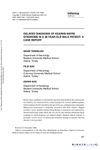January 2025 in “Journal of Personalized Medicine” This nationwide case-control study involving 100,203 participants (33,401 with Alopecia Areata and 66,802 controls) found that individuals with Alopecia Areata have a significantly increased risk of prediabetes and obesity. The odds ratio for prediabetes in Alopecia Areata patients was 1.62, and for obesity, it was 1.35, both with p-values <0.001, indicating a strong association. The study highlights the importance of monitoring metabolic health in patients with Alopecia Areata.
 December 2024 in “Australian Journal of General Practice”
December 2024 in “Australian Journal of General Practice” The woman's hair loss pattern doesn't match typical conditions like alopecia areata or female pattern hair loss.

Melatonin and photobiomodulation are effective for treating Alopecia X in German Spitz dogs.

YH0618 helps reduce chemotherapy-induced hair loss by targeting specific proteins and pathways.

A 9-year-old girl developed type 1 diabetes and alopecia after being treated for a rare kidney disease.
 February 2024 in “The Open dermatology journal”
February 2024 in “The Open dermatology journal” Alopecia Areata affects people of all ages worldwide, is likely caused by genetic and environmental factors, and can lead to stress and depression, highlighting the need for treatments that address both physical and mental health.
 November 2023 in “Indian Journal of Dermatology”
November 2023 in “Indian Journal of Dermatology” The study found that Frontal Fibrosing Alopecia in North-East India mainly affects middle-aged women and is often associated with lichen planus pigmentosus.
 October 2023 in “The Open public health journal”
October 2023 in “The Open public health journal” Alopecia greatly affects Greek women's daily life, relationships, and self-image, with mixed social support and dissatisfaction with treatments.
 January 2023 in “International Journal of Contemporary Pediatrics”
January 2023 in “International Journal of Contemporary Pediatrics” A rare genetic disease causes rickets and often hair loss in young children, which can improve with specific treatments.
 December 2021 in “Journal of clinical images and medical case reports”
December 2021 in “Journal of clinical images and medical case reports” Moth-eaten alopecia is linked to various skin diseases and requires early treatment to prevent worsening.
 July 2021 in “Open access journal of biomedical science”
July 2021 in “Open access journal of biomedical science” A lotion with natural extracts significantly sped up hair growth in women with hair loss from chemotherapy.
 January 2021 in “Our Dermatology Online”
January 2021 in “Our Dermatology Online” A young man's hair loss was the only sign of syphilis, which improved after treatment.
 May 2009 in “The American Journal of Dermatopathology”
May 2009 in “The American Journal of Dermatopathology” Mast cells play a significant role in hair loss conditions like male pattern hair loss and alopecia areata.
August 2022 in “Precision Clinical Medicine” JAM-A helps hair regrowth in alopecia areata by protecting VCAN in skin cells.
61 citations,
January 2011 in “PloS one” Notch signaling is essential for healthy skin and hair follicle maintenance.
56 citations,
September 2010 in “Veterinary pathology” Certain mouse strains develop a skin condition similar to a human hair loss disease due to genetic defects.
2 citations,
April 2022 in “Genes” The study found that the hair loss condition in Cesky Fousek dogs is influenced by multiple genes affecting skin and muscle structure, fat metabolism, and immunity.
2 citations,
October 2021 in “JID innovations” Uterine leiomyomas don't significantly change gene expression in the scalp of people with Central Centrifugal Cicatricial Alopecia.
 September 2023 in “International journal of women’s dermatology”
September 2023 in “International journal of women’s dermatology” Certain hairstyles, diabetes, scalp infections, and vitamin D deficiency may increase the risk of hair loss in Black women; more research is needed for better treatment.
January 2020 in “Springer eBooks”  5 citations,
January 2014 in “Current Dermatology Reports”
5 citations,
January 2014 in “Current Dermatology Reports” Many adult women suffer from persistent or late-onset acne, and while various treatments exist, finding the right one can be challenging.
 2 citations,
January 2008 in “International Journal of Neuroscience”
2 citations,
January 2008 in “International Journal of Neuroscience” A 38-year-old man was diagnosed late with Kearns-Sayre syndrome after being wrongly treated for epilepsy.
January 2017 in “Turkiye Klinikleri Journal of Dermatology” 5 citations,
December 2014 in “Molecular cytogenetics” A specific genetic change is linked to mental disorders, intellectual disability, and possibly autoimmune disease in a family.
 34 citations,
November 2008 in “British Journal of Dermatology”
34 citations,
November 2008 in “British Journal of Dermatology” Hair extensions can cause hair loss and scalp damage, and these problems might be more common than people realize.
 184 citations,
August 1983 in “The journal of pediatrics/The Journal of pediatrics”
184 citations,
August 1983 in “The journal of pediatrics/The Journal of pediatrics” Biotinidase deficiency has various symptoms and can be treated with biotin supplements.
 24 citations,
January 1993 in “Dermatologic Clinics”
24 citations,
January 1993 in “Dermatologic Clinics” Minoxidil effectively treats hair loss, works better for women, and requires consistent use.
 42 citations,
April 2013 in “Steroids”
42 citations,
April 2013 in “Steroids” Non-classic congenital adrenal hyperplasia is a common disorder causing symptoms like acne and infertility, and it's managed based on symptoms, not just test results. Treatment can improve fertility and reduce miscarriage risk.
 June 2021 in “Reactions Weekly”
June 2021 in “Reactions Weekly” Finasteride caused serious side effects and led to six suicides.



















